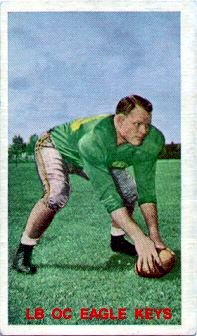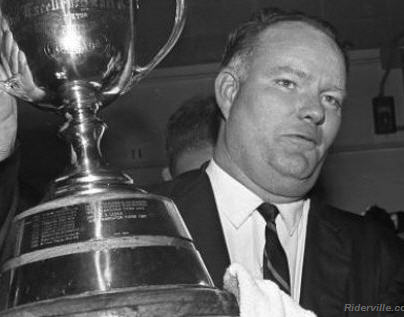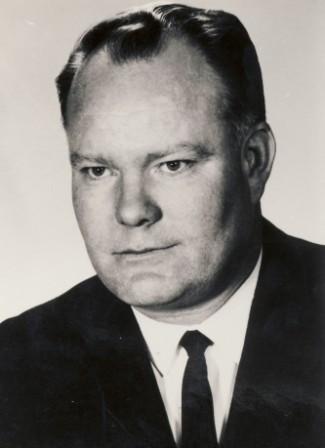Eagle Keys played six years in the CFL, but is probably best remembered as a coach. Keys was a center on offence and a linebacker on defence in the days when most players went both ways. Keys played three years in Montreal (1949-51) and three years in Edmonton (1952-54), winning one Grey Cup with the Alouettes in 1949 and one with Edmonton in 1954, the year of the Jackie Parker fumble return to win the game. Keys won a pair of West division all-stars at center in 1953 and 1954 (there were no CFL all-stars until 1962).
Keys started his coaching career the year after he retired. From 1955-58, Keys was an assistant coach for the Eskimos, winning two more Grey Cups in 1955 and 1956 as Edmonton completed their three year sweep of Grey Cups over the Montreal Alouettes. In 1959, Keys became the head coach of the Eskimos and held that post for five seasons from 1959 to 1963.
In 1964, Keys joined the Saskatchewan Roughriders as an assistant coach, and would become the head coach in 1965. Keys would remain the Rider head coach for six years from 1965 to 1970. Keys is well and fondly remembered in Saskatchewan as the team's head coach when the franchise finally won its first Grey Cup in 1966. Still, all good things come to an end and Keys moved on from Saskatchewan for his third and final head coaching job in the CFL with the BC Lions from 1971 to 1975.
Eagle Keys was elected to the Canadian Football Hall of Fame in 1990 as a buildier (coach).
Eagle Keys passed away on December 20, 2012 (see longer article on Key's death below his stats).
Eagle Keys in the Canadian Football Hall of Fame
CFL Mourns Loss of Eagle Keys - December 20, 2012
Legendary Saskatchewan Roughriders Coach Eagle Keys Dead at 89
| Year | Team | GP | Int | Yds | Avg | TDInt | Long | FR | Yds | Avg | TD | Long | FF |
|---|---|---|---|---|---|---|---|---|---|---|---|---|---|
| 1949 | MON | 12 | |||||||||||
| 1950 | MON | 12 | |||||||||||
| 1951 | MON | 13 | |||||||||||
| 1952 | EDM | 13 | 3 | 26 | 8.7 | 0 | 2 | 0 | |||||
| 1953 | EDM | 16 | 0 | 0 | 0 | 0 | 0 | 0 | 0 | 0 | 0 | 0 | |
| 1954 | EDM | 16 | 0 | 0 | 0 | 0 | 0 | 0 | 0 | 0 | 0 | 0 |
No individual stats were kept in the East except scoring until 1954.
| Year | Team | F | FL |
|---|---|---|---|
| 1949 | MON | 0 | |
| 1950 | MON | 0 | |
| 1951 | MON | 0 | |
| 1952 | EDM | 0 | |
| 1953 | EDM | 0 | |
| 1954 | EDM | 1 |
From a Canadian Press article (2012)
Eagle Keys, a Canadian Football Hall of Fame inductee who played in the 1954 Grey Cup on a broken leg, has died at the age of 89.
Keys won two Grey Cups as a player, with Montreal and Edmonton, and also coached the Saskatchewan Roughriders to their first CFL title in 1966 before completing his gridiron tenure as field boss of the B.C. Lions. He passed away early Thursday.
"It's exemplary, what he did in Saskatchewan," said former B.C. Lions kicker Ted Gerela, who played under Keys in the early 1970s. "He was the top of his game."
Gerela also praised Keys for following a tough coaching act in Jackie Parker in B.C. and rebuilding the Lions from the ground up.
"A lot of people are going to be shocked to hear that he died, like they were when (former quarterback and coaching great) Ronnie Lancaster passed away," said Gerela.
The former kicker recalled that Keys would not let him specialize. As a result, he had to serve as a backup to three positions, seeing action at fullback and halfback.
"He felt if you could play, you could kick," said Gerela.
He noted that Keys took the same approach with Saskatchewan kicker Jack Abendschan, who also played offensive guard.
"He was a tough disciplinarian," said Gerela. "He expected you to do the job. But he approached every player on their own merit. He treated everybody the same."
Saskatchewan president and CEO Jim Hopson called Keys "a legend who will always hold a special place in the hearts of Roughriders' fans."
"While he will always be thought of as one of the greatest coaches in CFL history, more importantly he was a tremendous person," said Hopson in a statement. "Eagle was kind enough to join the Riders in 2006 as the team celebrated the 40th anniversary of our first Grey Cup championship. He will be missed by our entire organization."
Keys established his legendary status by playing the final game of his six-year CFL career with a broken bone in his knee. He helped his Edmonton Eskimos upset the heavily favoured Montreal Alouettes 26-25 in the 42nd Grey Cup at Varsity Stadium in Toronto.
His second Grey Cup victory as a player came after he won as a member of the 1949 Alouettes as they triumphed 28-15 over the Calgary Stampeders, also in Toronto.
He also appeared in the 1952 Grey Cup, only to see his Eskimos club lose to the host Toronto Argonauts on the same Varsity Stadium field on which he played his other two.
Keys played centre and linebacker for five years with Montreal (1949-51) and with the Eskimos (1952-54), being named to three CFL all-star teams.
"He was a solid football man and great with the guys," said former Lions defensive end and linebacker Norm Fieldgate, a Hall of Famer who played against Keys in the early 1950s, but did not battle him directly.
As for the legendary 1954 Grey Cup game, Fieldgate said: "He sucked it up and played the whole game, I think."
Keys switched to coaching after retiring as a player, starting as an assistant in Edmonton in 1955. He became the Eskimos' head coach in 1959, a job he held until 1963.
He then moved to Saskatchewan (1965-70), where he guided the Roughriders to their historic first Grey Cup win. He guided the Lions from 1971-75 before his coaching career came to an abrupt end.
Lions general manager Bob Ackles fired Keys six games into the 1975 season and replaced him with a future hall of fame coach, Cal Murphy.
Keys, who was inducted into the Canadian Football Hall of Fame as a builder in 1990, spent his later life in the Vancouver area.
Before moving to Canada, Keys was an outstanding centre and linebacker for the University of Western Kentucky Hilltopper football team in 1942 and, after serving in the Marine Corps in the Second World War, 1946 and 1947.
He also lettered in baseball as a pitcher and outfielder in three straight post-war years (1946—48). He was an All-Kentucky Intercollegiate Athletic Conference selection in football as a senior.
In 1946, his baseball team went a perfect 9—0, outscoring the opponents by an average of five runs a game. His collegiate sporting achievements earned him entry into the Western Kentucky University Athletic Hall of Fame in 1994.


